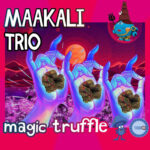The BMJ study found potential in the use of psilocybin to treat depression, with the greatest improvements notable in older patients, those with secondary depression, and individuals who had used psychedelics before.
Globally, the number of people affected by depression is estimated to be around 300 million, and it is also a major contributor to disability. For many years researchers have been trying to come up with solutions for this growing mental health epidemic. The BMJ’s study indicates that psilocybin could be that solution.
The Future Looks Bright
At this moment, the future of the magic mushroom extract is looking bright, with psilocybin forecast to be the fourth-highest selling psychedelic drug by 2029, according to the Global Data’s 2024 Psychedelics Therapeutics Development and Trends. As well as its recreational popularity, the power psilocybin has to act on the serotonin receptors and reset the brain’s activity means that all eyes are currently on it. Author of the report, and analyst at Global Data, Eleni Tokali explained;
“This ‘reset’ effect, observed in neuroimaging studies, suggests a restructuring across different regions of the brain which underpins not only its rapid but also its sustained effect after the effects of the drug have worn off.”

How The BMJ Study Worked
This is how the study went down. So that they could compare psilocybin for depression symptoms with controls, such as a placebo, niacin (vitamin B), or microdoses of psychedelics, the team (led by UK researchers) searched databases for randomized controlled trials.
The inclusion of studies that involved psychotherapy in both experimental and control contexts allowed the comparison of psilocybin and psychotherapy effects.
The study looked at seven relevant trials that included 436 individuals with depression. Of the 436, 52% were female, and 90% were white. The researchers measured depression scores using a statistical method known as Hedges’ g. Hedges’ g is a method to measure how one data group differs from another in terms of effect. A Hedges’ g of 0.2 indicated a small effect, 0.5 a moderate effect, and 0.8 or more suggested a significant effect.
The psilocybin treatment had a more significant impact on depression scores than any of the comparator control treatments. Additionally, its effects were favored by the large size of the effect, reflected by its Hedge’s g of 1.64.
Interestingly, further analyses aimed at adjusting for differences in the trials found that having secondary depression instead of first, using the “so-called underlying disease” as the evaluation criteria, being judged on a “so-relevant scale” by the individual, being an older age, and having previously used psychedelics were all linked to the improvement of symptoms.

Psilocybin Most Effective For Older Patients
The effectiveness of psilocybin in relation to age was particularly intriguing. The drug was shown to reduce depression levels further for every year older a patient was. Researchers suggested this could be due to older patients reporting a “higher ‘blissful state’ experience” from the drug.
They added; “This might be because of older people’s increased experience in managing negative emotions,”
This correlates with the belief that magic mushrooms are a tool with which to heal, rather than a ‘silver bullet’. The more equipped and capable you are emotionally, the better you are able to use the mind opening benefits of the drug. Older people tend to know themselves better, and have more established coping strategies. This could all feed into why the effect of psilocybin becomes increasingly beneficial with age.
A notable limitation of the study was the limited diversity among the participants, with 90% of participants being white. Another was that in clinical trials, psilocybin tends to be given to patients in a peaceful, controlled environment, with elements such as soothing music. This is not common within the standard healthcare system, meaning that it is harder to use as an accurate representation of real life.
“The Results Are Impressive”
The researchers concluded that the results “support a prudent approach in both scholarly and public settings, because more and better evidence is needed before any clinical recommendation can be made about therapeutic use of psilocybin.”

They added that the findings are encouraging, but further research is needed “to clarify the factors that maximise psilocybin’s treatment potential for symptoms of depression”.
Dr. Paul Keedwell, consultant psychiatrist and fellow of the Royal College of Psychiatrists said “The results are impressive, with rapid improvement in most, and large effect sizes… Longer follow ups would be welcome, and there is more work to be done on optimal dosing,”
“It seems that a strong psychedelic experience is needed to get the best results.”





